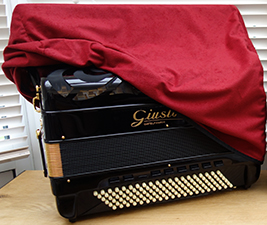• Cleaning
Use a soft dry cloth to clean and polish your accordion. Ensure the cloth is clean as any engrained dirt will act as an abrasive and scratch the lacquered surface of your accordion. Do not use strong chemical cleaners or polishes.
Dirt and dust that may have accumulated on and between the keys and buttons can be gently removed using a soft artist’s brush.
Periodically dust the bellows folds, paying particular attention to the top of the bellows which is most prone to accumulating dirt and debris. A soft artist’s brush or decorator’s dusting brush is ideal for this task.
• Storage
Store your accordion sitting on its feet, keyboard facing up. Make sure the bellows straps are clipped shut top and bottom.
When not in use, your accordion is best stored in its case. However, if you play your accordion regularly you may prefer to keep it on a hard stable raised surface and protect it with a dust cover.
Accordion Lounge velour Dust Covers are an ideal way to protect your treasured instrument.
Avoid leaving your accordion on the floor where it will be vulnerable to kicks and knocks.
• Temperature Extremes and Moisture
Always avoid storing your accordion in very hot or cold conditions. Do not place your accordion near a hot radiator or leave it exposed to direct sunlight. Accordion reeds are secured with wax which can soften or melt in very hot conditions.
Exposure to cold temperatures can result in condensation forming inside the accordion when it is moved into a warmer environment resulting in rusting of metal components.
Storing your accordion in damp conditions is not recommended as moisture can cause the wooden body of the accordion to warp and metal parts to rust.
Accordions are best kept in warm, clean and dry conditions.
• Keys and Buttons
Care should be taken not to bend or knock the keys and buttons, especially when lifting the accordion in and out of its case. When putting an accordion in its case, the treble keyboard generally goes in first followed by the bass end. The shoulder straps (wrapped in a soft cloth) can lie along the keyboard. Alternatively they can be left at the back of the accordion tucked behind the treble keyboard.
• Bellows
Do not allow your accordion to be pulled open unless a key or button is depressed. Operating the bellows with too much force, even when playing, can strain the reeds and force them out of tune or even break them.
Belts, zips, buttons and jewellery can scratch or tear the back of the bellows. Damage can be prevented by installing a backpad to protect the bellows.
• Straps and Scratches
Shoulder strap buckles can scratch the body of your accordion. Particular care is needed when lifting your accordion in and out of its case as this is when damage is most likely to occur.
The Accordion Lounge offer easy fit velour Buckle Covers to help protect your accordion from buckle damage.
It is advisable not to wear a wristwatch on your left hand when playing to prevent scratching the bass panel and wrist strap. Wearing a watch on your right hand will avoid inadvertently damaging your accordion.
• Handling your Accordion
Accordions are generally robust, however being made of hundreds of individual parts they are vulnerable to careless handling and sudden impacts which can damage the levers, palettes or reeds. Accordions do not like to be dropped - even from a small height!
When picking your accordion up and putting it down, always hold it with both hands and by the straps if they are sturdy enough.
Play with correctly attached and adjusted shoulder straps - playing without straps is difficult, uncomfortable and significantly increases the risk of dropping the accordion.
• Transporting your Accordion
Always transport your accordion in a suitable hard case or padded Gig Bag. Make sure the accordion is stowed with its bellows straps locked and shoulder straps secured neatly in your preferred position.
Ensure that case/bag latches, zips or buckles are closed properly. If carrying the case at your side, have the lid facing your leg - should it come open, the accordion will fall against you and not drop out onto the floor.



















